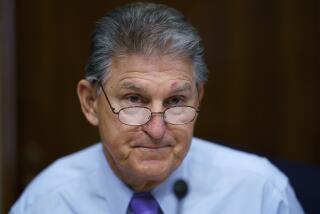Iraq legislators pass provincial vote bill
BAGHDAD — Iraqi lawmakers overcame months of infighting to pass legislation Wednesday setting the stage for provincial elections by early next year, an achievement sought by the United States to correct lopsided power structures blamed for sectarian violence.
As legislators overwhelmingly approved the bill, assailants armed with grenade launchers and machine guns ambushed an Iraqi police patrol north of Baghdad, killing 14 policemen and eight U.S.-allied paramilitary fighters, according to the U.S. military. The brazen ambush was a sign of the challenges ahead as Sunni Arab insurgents loyal to group Al Qaeda in Iraq try to derail political and security gains.
Passage of the election bill gained urgency as Washington sought to reduce its troop presence in Iraq and as Prime Minister Nouri Maliki became more assertive in cementing his government’s sovereignty. Redrawing the political landscape is considered key to a functioning democracy in Iraq in which Shiite Muslims, Sunni Arabs, Kurds, Christians and other minorities share power. Sunni Arabs in particular have been underrepresented in political institutions because of their boycott of the last election in 2005.
In Washington, President Bush lauded the passage of the provincial elections bill, which still requires the Iraqi Presidency Council’s approval.
“Nothing is more central to a functioning democracy than free and fair elections,” Bush said. “Today’s action demonstrates the ability of Iraq’s leaders to work together for the good of the Iraqi people and represents further progress on political reconciliation.”
The bill’s passage came with some major hurdles attached, at least one of which was described as a “very dark” cloud by the United Nations’ special representative, Staffan de Mistura.
That issue involves the northern city of Kirkuk, which Kurdish leaders want as part of the semiautonomous Kurdistan region. The city’s Sunni Arab and Turkmen populations oppose the idea. All the groups had feared that holding provincial elections now in Tamim, whose capital is Kirkuk, would deny them the power they seek in the oil-rich region, so the decision was made to postpone voting there.
“In every great day there is a cloud,” De Mistura said of the postponement. “It is very dark. It is the issue of minorities. This is a sensitive issue.”
But the parliament speaker, Mahmoud Mashadani, said the fact that lawmakers didn’t let the Kirkuk dispute derail the bill should be lauded.
The legislation mandates that a parliamentary committee review the Kirkuk issue and by March make recommendations on resolving it. Elections also will be delayed in the three provinces under the regional government in Kurdistan -- Dahuk, Irbil and Sulaymaniya.
Other significant portions of the legislation include guaranteeing women 25% of provincial council seats, banning the use of pictures of ayatollahs or other religious leaders not associated with a party and replacing the closed-slate system with an open slate in which people vote for individuals rather than parties.
The use of religious symbols on ballots and the closed-slate system, which let party bosses name provincial council representatives, were considered flaws in the 2005 vote. Critics said they made it easy for religious parties to lure voters with pictures of revered ayatollahs, and that they created provincial councils loaded with people loyal to the party leaders who had given them their posts rather than to constituents.
“We made use of the former law’s faults to reach this new law,” Mashadani said.
Despite the celebratory tone after the vote, there were grumblings.
Alaa Talabani, a Kurdish lawmaker, said she had hoped for a 50% quota for female candidates.
Younadam Kanna, a Christian legislator from northern Iraq, called it a “big disappointment” that lawmakers had excluded Kurdish regions that are home to several religious minorities.
“There is a trend to eradicate us from government jobs,” he said.
A bill passed in February that included Kirkuk in the voting plan was vetoed in July by the three-member Presidency Council because of Kurdish objections.
Of bigger concern perhaps is the delay in the elections and the prospect of violence in the run-up. U.S. officials made it clear that they wanted provincial elections held this year. The vetoed bill had called for them to be held by October.
The elections could also set the stage for bitter rivalries to erupt after months of relative calm. The most dangerous could be in the Shiite south, where Maliki’s Islamic Dawa Party will vie against candidates backed by anti-U.S. Shiite cleric Muqtada Sadr. The cleric’s group boycotted the 2005 provincial vote, but he has said his political bloc will endorse candidates in this election, presenting Maliki with a formidable foe.
The ambush Wednesday in Diyala province, north of Baghdad, highlighted the potential for bloodshed and offered a sign of the challenge ahead as the government tries to plan voting in volatile areas.
Police said armed men attacked a checkpoint set up by the Iraqi police in a neighborhood of south Baqubah. The unit called in reinforcements, which the assailants ambushed.
The U.S. military said 14 Iraqi policemen and eight Sons of Iraq fighters, who are allied with U.S. and Iraqi security forces, were killed. Iraqi officials put the death toll at 12 policemen, with seven or eight paramilitary fighters killed.
“What happened today . . . is the best example that Al Qaeda can regenerate and they are not finished yet,” said Sheik Amer Khazal Karim, a Sons of Iraq leader in Diyala.
--
Times staff writer James Gerstenzang and special correspondents in Baghdad and Baqubah contributed to this report.
More to Read
Sign up for Essential California
The most important California stories and recommendations in your inbox every morning.
You may occasionally receive promotional content from the Los Angeles Times.











